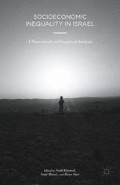Abstract
It is well known that the Palestinian-Arab citizens of Israel (hereafter Arabs) suffer a far higher risk of poverty than the vast majority of Jewish citizens. Moreover, as the National Insurance Institute (NII) documents year after year, the welfare state in Israel lifts far fewer Arab than Jewish families out of poverty. Compared to a hypothetical world with no redistribution, in 2012 taxes and transfer payments combined reduced the proportion of Arab households in poverty by only 8.4 percent.1 The parallel rate for Jews was 45.5 percent.
Access this chapter
Tax calculation will be finalised at checkout
Purchases are for personal use only
Preview
Unable to display preview. Download preview PDF.
References
Amusin, Marina. 2010. “Insufficient Take-up of National Insurance Benefits among the Palestinian Population of East Jerusalem.” MA thesis, Department of Sociology, The Hebrew University, Jerusalem.
Aviram, Uri, Johnny Gal, and Yosef Katan. 2007. The Design of Social Policy in Israel, Trends and Issues (in Hebrew). Jerusalem: Taub Center for Social Policy Studies in Israel.
Buhmann, Brigitte, Lee Rainwater, Guenther Schmaus, and Timothy M. Smeeding. 1988. “Equivalence Scales, Well-Being, Inequality, and Poverty: Sensitivity Estimates across Ten Countries Using the Luxembourg Income Study (LIS) Database?” Review of Income and Wealth 34(2):115–42.
Cohen, Asher and Bernard Susser. 2000. Israel and the Politics of Jewish Identity: The Secular-Religious Impasse. Baltimore, MD: Johns Hopkins University Press.
Cohen, Lee, C. Eugene Steuerle, and Adam Carasso. 2001. “Social Security Redistribution by Education, Race, and Income: How Much and Why.” Paper presented at the Third Annual Conference of the Retirement Research Consortium “Making Hard Choices About Retirement,” Washington DC, May 17–18.
Friedman, Eyal and Michael Shalev. 2010. “Loyalty Benefits” (in Hebrew). Pp. 55–75 in Caring State—Neglectful State, edited by H. Katz and E. Tzfadia. Tel Aviv: Resling.
Friedman, Israela, Nava Shau-Mena, Nir Fogel, Dmitri Romanov, Dan Amedey, Mark Feldman, Ruth Sehayek, Gustavo Schifris, and Haim Portnoy. 2011. Measurement and Estimates of the Population of Ultra-Orthodox Jews (in Hebrew). Jerusalem: Central Bureau of Statistics.
Gal, John. 1998. “Categorical Benefits in Welfare States: Findings from Great Britain and Israel.” International Social Security Review 51(1):73–101.
Gal, John. 2008. “Immigration and the Categorical Welfare State in Israel.” Social Service Review 82(4):639–61.
Gal, John. 2010. “The Social Security System.” Policy Paper No. 2010.06, Taub Center for Social Policy Studies in Israel, Jerusalem.
Gal, John and Michael Bar. 2000. “The Needed and the Needy: The Policy Lega cies of Benefits for Disabled War Veterans in Israel.” Journal of Social Policy 29(4):577–98.
Gal, John, Michael Shalev, and Mimi Ajzenstadt. 2009. “Thanks to Universalism Takeup of Universal Social Rights in the Israeli Social Insurance System” (in Hebrew). Pp. 187–224 in Accessibility to Social Justice in Israel (in Hebrew) edited by J. Gal and M. Ajzenstadt. Jerusalem: Taub Center for Social Policy Studies in Israel.
García-Fernández, Rosa María, Daniel Gottlieb, and Federico Palacios-González 2013. “Polarization, Growth and Social Policy in the Case of Israel.” 1997–2008: Economics: The Open-Access, Open Assessment E-Journal 7 (2013–15).
Gera, Ramses and Raphaela Cohen. 2001. “Poverty among Arabs in Israel and the Sources of Inequality between Arabs and Jews” (in Hebrew). Rivon Lekalkala 48(Dec.):543–71, Presented to the Sapir Forum for Economic Policy.
Ilan, Shahar. 2000. Haredim Inc (in Hebrew). Jerusalem: Keter.
Levy, Yagil. 2008. “Israel’s Violated Republican Equation.” Citizenship Studies 12(3):249–64.
Lewin, Alisa C. and Haya Stier. 2002. “Who Benefits the Most? The Unequal Allocation of Transfers in the Israeli Welfare State.” Social Science Quarterly 83(2):488–503.
Parliamentary Research and Information Center. 2010. Income Security under National Insurance and for Yeshiva Students (Hebrew). Jerusalem: The Knesset
Peled, Yoav. 1992. “Ethnic Democracy and the Legal Construction of Citizen ship — Arab Citizens of the Jewish State.” American Political Science Review 86(2):432–43.
Rosenhek, Zeev and Michael Shalev. 2000. “The Contradictions of Palestinian Citizenship in Israel: Inclusion and Exclusion in the Israeli Welfare State.” Pp. 288–315 in Citizenship and the State in the Middle East, edited by N. A. Butenschon U. Davis, and M. Hassassian. Syracuse, NY: Syracuse University Press.
Shafir, Gershon and Yoav Peled. 2002. Being Israeli: The Dynamics of Multiple Citizenship. Cambridge, UK: Cambridge University Press.
Shalev, Michael. 2010. “Loyalty Benefits and the Welfare State.” http://wwwfljs.org/content/loyalty-benefits-and-welfare-state, Foundation for Law, Justice and Society, University of Oxford, Oxford.
Swirski, Shlomo, Etty Konor, and Yaron Yecheskel. 1998. “Government Allocations to the Ultra-Orthodox (Haredi) Sector in Israel.” Adva Center, Tel Aviv.
Van Oorschot, Wim J. H. 1998. “Failing Selectivity: On the Extent and Causes of Non-Take-up of Social Security Benefits.” Pp. 101–32 in Empirical Poverty Research in a Comparative Perspective, edited by H. J. Andress. Aldershot: Ashgate.
Editor information
Copyright information
© 2016 Nabil Khattab, Sami Miaari, and Haya Stier
About this chapter
Cite this chapter
Shalev, M., Lazarus, A. (2016). Horizontal Inequality in Israel’s Welfare State: Do Arab Citizens Receive Fewer Transfer Payments?. In: Khattab, N., Miaari, S., Stier, H. (eds) Socioeconomic Inequality in Israel. Palgrave Macmillan, New York. https://doi.org/10.1057/9781137544810_11
Download citation
DOI: https://doi.org/10.1057/9781137544810_11
Publisher Name: Palgrave Macmillan, New York
Print ISBN: 978-1-349-57288-5
Online ISBN: 978-1-137-54481-0
eBook Packages: Social SciencesSocial Sciences (R0)

